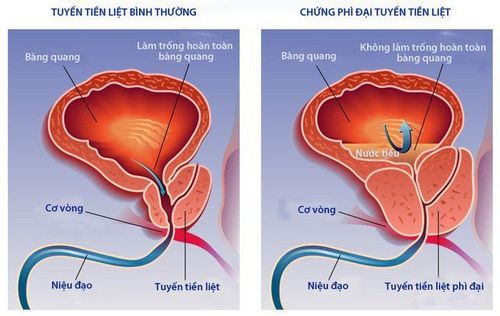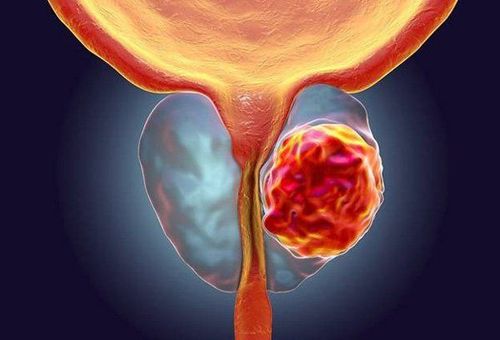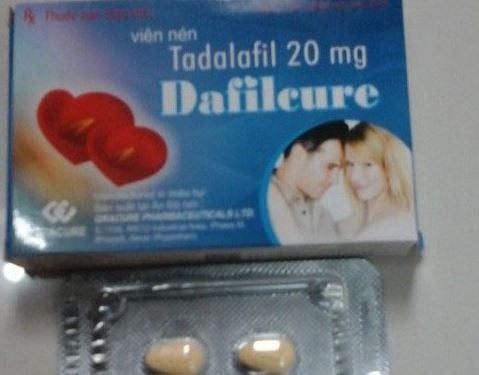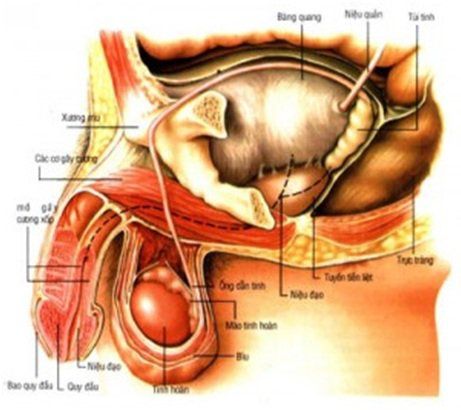This is an automatically translated article.
The article was professionally consulted with MSc Vo Thien Ngon - Urologist, Department of General Surgery, Vinmec Da Nang International Hospital.Enlargement of the prostate gland and prostate cancer are common diseases in men entering middle age. These diseases can cause many complications that negatively affect the patient's health. So, does prostate enlargement and prostate cancer become cancer?
1. Concepts related to prostate enlargement and prostate cancer
1.1 Functions of the Prostate The prostate is a gland in the male reproductive system, located at the entrance of the bladder and surrounding the urethral canal. The prostate gland in boys is about the size of a pea, and plays almost no role. When a man reaches adulthood, the prostate gland will grow larger, with a volume of about 20g.
Prostate gland has 2 main functions:
Genital function: Prostate gland secretes fluid, contributing to the creation of semen - as a medium for transporting sperm; Transport function: Urinary tract and seminal vesicle both pass through the prostate gland. The prostate gland is involved in the process of urination and ejaculation. 1.2 Enlargement of the prostate gland, what is prostate cancer? In men over the age of 50, an enlarged prostate is common. This phenomenon occurs when the fibroid tissue puts pressure on the urinary tract, making it difficult for the patient to urinate, frequent urination and affecting other body functions.
Some serious complications of the disease include:
Urinary retention: The patient has urethral compression causing acute urinary retention. Patients have symptoms of difficulty urinating, frequent urination, or lower abdominal distension, weakness, interruption,...; Bladder dysfunction: When the bladder is often stretched, it will appear deformed, change its contractile function, and make it difficult to excrete urine. Patients are prone to urine leakage, urinary retention,...; Bladder stones: Long-term urinary retention causes stagnation of urine in the bladder, leading to sediment accumulation, bladder stone formation. Bladder stones are a place for bacteria to hide, easy to cause infection; Urinary tract infections: Patients present with blood in the urine, which may be accompanied by high fever, pain in the hips and back. If bacteria invade back up, it can cause pyelonephritis, kidney damage or even blood infection - life-threatening; Kidney failure: Bacterial pyelonephritis can persist and lead to kidney failure. Symptoms of kidney failure patients are fatigue, swelling in the face, ankles, wrists, itching and skin rash.

2. Enlargement of the prostate gland, can prostate fibroids become cancerous?
The nature of prostatic hypertrophy is a benign proliferation. When there is an enlarged gland, there is no evidence that a benign will turn malignant. However, in clinical practice, it is possible for a patient to have both prostate enlargement and cancer at the same time.
2 Benign prostatic hypertrophy and prostate cancer share some of the same symptoms. To distinguish them, it is necessary to rely on:
Benign prostatic hyperplasia usually develops in the central region, quickly appears and causes symptoms in the lower urinary tract. When PSA biomarkers were tested, prostate enlargement was normal or slightly increased; Prostate cancer usually develops in the periphery of the prostate gland, so there are few symptoms when it first appears. Until the cancer has grown, spreading to the central area will cause specific symptoms. At this time, the patient is only diagnosed with cancer and often the disease is at an advanced stage. When testing PSA biomarkers, the PSA index of prostate cancer patients will be high. Thus, it is still not confirmed whether prostate enlargement, prostate cancer will become cancerous or not. In many cases, a patient has both benign prostatic hyperplasia and prostate cancer. Therefore, patients need to see a specialist to screen and detect cancer early, thereby having appropriate treatment.

3. Methods of treatment of prostate enlargement, prostate cancer
In the case of prostate enlargement that develops but does not affect the urethra, only monitoring is needed, no treatment is required. With different levels of disease, there will be different treatment options. Specifically:
Mild: Patients are instructed to change their diet, practice sports, moderate activities, reduce stimulants such as alcohol, beer, tobacco,... in combination. with periodic health monitoring; Moderate and severe severity: Can be treated medically. There are many drugs that are used to block alpha receptors, which help the bladder neck muscles to relax to make it easier for patients to urinate, improving symptoms. In addition, it is possible to combine the use of drugs that slow down prostate growth to alleviate uncomfortable symptoms of the disease. At the same time, drugs that inhibit bladder contractions, PDE5 inhibitors, etc. are also used to treat weakness in urine, helping to improve urine outflow; When medical treatment fails or the patient develops complications of prostate enlargement such as bladder stones, hematuria, kidney failure, bladder diverticulum, etc., surgical intervention is required. The methods of endoscopic ablation, using laser to remove the nucleus to make the urinary tract open, using stents to widen the bladder neck, occlusion of the prostate, ... are being widely applied recently. Although there is no evidence to prove a link between prostate enlargement, prostate cancer and prostate cancer, patients still need to be careful and quickly seek medical attention if there are signs of suspicion of these diseases. Early intervention and treatment will improve the chances of cure and improve the patient's quality of life.

Vinmec International General Hospital with a system of modern facilities, medical equipment and a team of experts and doctors with many years of experience in medical examination and treatment, patients can rest assured to visit. examination and treatment at the Hospital.
Please dial HOTLINE for more information or register for an appointment HERE. Download MyVinmec app to make appointments faster and to manage your bookings easily.














